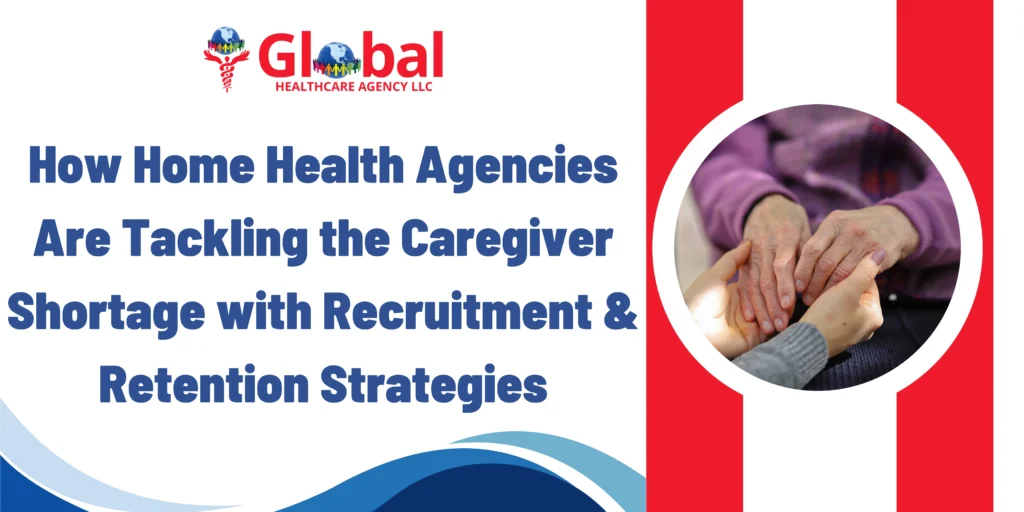The caregiver shortage is a critical challenge for the home health industry, affecting families who rely on in-home care for their loved ones. As demand for home health services grows, home health agency recruitment efforts are focused on attracting and recruiting skilled caregivers to meet client needs. By adopting effective caregiver shortage recruitment and retention strategies, agencies can build a stable workforce committed to quality care. This blog explores innovative solutions to caregiver shortage issues and highlights the retention strategies for caregivers that are helping agencies maintain dedicated, compassionate staff.
Understanding the Caregiver Shortage Crisis
The caregiver shortage arises from a combination of factors, including an aging population, high turnover rates, and a limited pool of trained professionals. With many seniors preferring to age in place, the demand for skilled in-home caregivers has surged. However, recruiting skilled caregivers and retaining them has proven challenging due to the demanding nature of the work, emotional burnout, and competitive job markets. Recognizing the urgency, home health agencies are implementing targeted recruitment and retention strategies to ensure that clients receive consistent, compassionate care.
For more information on how Global Healthcare Agency provides reliable home health care, visit our Home Health Services page.
Recruitment Strategies to Attract Skilled Caregivers
1. Offering Competitive Compensation and Benefits
One of the primary ways home health agencies are addressing the caregiver shortage is by offering competitive salaries and benefits packages. Caregivers often face demanding roles, and attractive compensation can make these positions more appealing. Benefits like health insurance, paid time off, and retirement plans are becoming standard in many agencies, as they create a more sustainable and rewarding work environment for caregivers.
Offering financial incentives, signing bonuses, and other perks also helps agencies stand out in the competitive market, making them more attractive to skilled caregivers.
2. Building a Positive Work Culture
A supportive and respectful work culture is essential for retention strategies for caregivers. Agencies are fostering positive work environments by providing regular feedback, celebrating caregiver achievements, and maintaining open communication. By creating a workplace where caregivers feel valued and appreciated, agencies can boost job satisfaction and reduce turnover rates. A positive work culture also promotes loyalty, as caregivers are more likely to stay with an agency that respects their contributions.
For agencies looking to enhance work culture, companion care services often allow caregivers to build personal connections with clients, which adds fulfillment to their roles.
3. Leveraging Technology for Recruitment
Home health agency recruitment has evolved with technology, as agencies now use digital platforms to reach a broader pool of candidates. Social media, job boards, and specialized recruitment platforms help agencies connect with caregivers looking for in-home care positions. Additionally, agencies are investing in online applications and streamlined hiring processes to make it easier for caregivers to apply and interview for positions.
Technology also allows agencies to track recruitment metrics, helping them identify successful strategies and areas for improvement in their hiring efforts.
Retention Strategies to Keep Skilled Caregivers Engaged
1. Providing Ongoing Training and Professional Development
One of the most effective retention strategies for caregivers is offering ongoing training and development opportunities. By providing access to specialized training, certifications, and workshops, agencies can help caregivers expand their skills and advance their careers. Professional development not only enhances job satisfaction but also improves the quality of care provided to clients, as caregivers gain new insights and techniques for supporting seniors.
Global Healthcare Agency prioritizes continuous training, ensuring that caregivers are well-prepared to handle a variety of client needs. Learn more on our Private Duty Nursing page.
2. Offering Emotional and Mental Health Support
Caregiving can be emotionally and physically demanding, often leading to burnout. Home health agencies are implementing support programs that address caregivers’ mental health and well-being. Offering counseling services, mental health days, and stress management workshops can help caregivers manage the emotional challenges of their roles. By prioritizing caregivers’ well-being, agencies create a supportive work environment that promotes long-term retention.
For caregivers who work closely with clients over extended periods, respite care can provide essential breaks that help prevent burnout.
3. Creating Clear Career Advancement Paths
Caregivers often seek opportunities for growth, and agencies that offer clear advancement paths are more likely to retain their employees. Home health agencies are developing structured career progression plans, allowing caregivers to advance from entry-level roles to supervisory positions or specialized areas, such as private duty nursing. By providing these opportunities, agencies show that they value caregiver contributions and are invested in their professional growth.
Offering mentorship programs and leadership training can further support career development, making caregiver roles more sustainable and fulfilling.
Innovative Solutions to the Caregiver Shortage
1. Utilizing Part-Time and Flexible Scheduling Options
Flexibility is a key factor for many caregivers. By offering part-time and flexible schedules, agencies can attract caregivers who need adaptable hours. Flexible scheduling allows caregivers to balance personal and professional commitments, making caregiving a more viable career option. Agencies that embrace flexibility are likely to see higher retention rates, as caregivers appreciate the work-life balance.
2. Partnering with Educational Institutions
Some agencies are partnering with vocational schools and community colleges to create pipelines of new caregivers. By offering internships, apprenticeships, or tuition reimbursement programs, agencies can encourage students to pursue careers in caregiving. These partnerships not only provide agencies with a steady stream of trained caregivers but also raise awareness about the rewarding aspects of caregiving careers.
Educational partnerships can help agencies build a sustainable workforce while encouraging students to consider caregiving as a fulfilling career path.
Embracing a Future of Sustainable Home Health Care
The caregiver shortage is a complex issue, but home health agencies are rising to the challenge with creative recruitment and retention strategies. By investing in their workforce, agencies not only address the shortage but also improve the quality of care for clients. From competitive compensation to mental health support, these strategies make caregiving more rewarding and sustainable.
For families looking for compassionate, reliable home health services, Global Healthcare Agency is dedicated to providing quality care through a team of skilled, supported caregivers.


